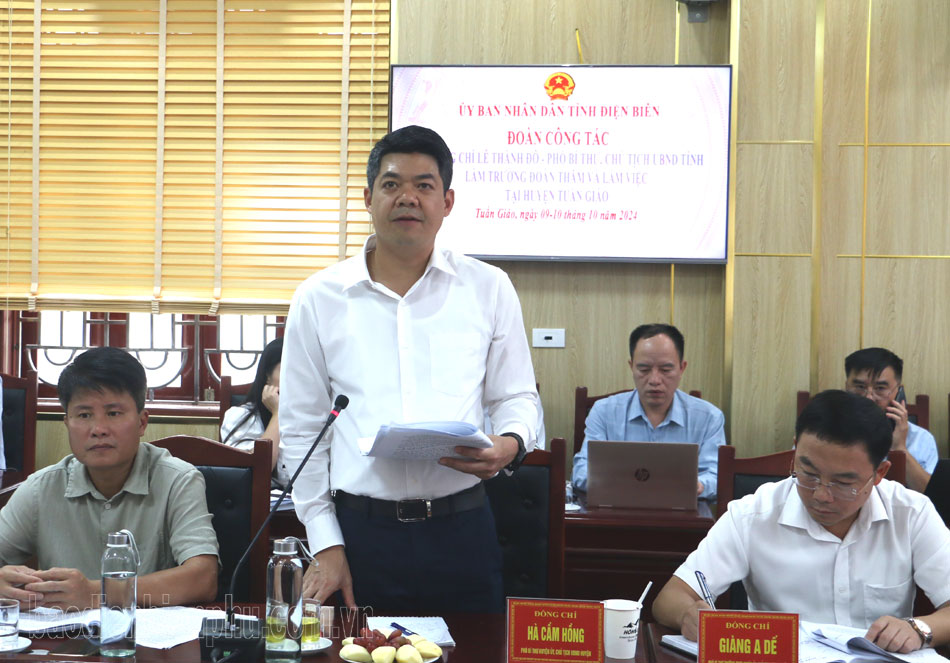He made these remarks on Thursday during a working session with Tuần Giáo’s leadership regarding the district's socio-economic development, public investment disbursement over the first nine months of 2024, and the preparation of the medium-term public investment plan for 2026-2030.
.jpg)
Lê Thành Đô, Deputy Secretary of the Provincial Party Committee and Chairman of the Provincial People's Committee, speaks at the working session with Tuần Giáo District’s leaders.
In the first nine months of 2024, Tuần Giáo continued to effectively implement its two breakthrough areas in socio-economic development, inlcuding agricultural restructuring, with a focus on crop diversification, and urban infrastructure development.
The district allocated more than 12,006 hectares of land and forest, accounting for 77.6 per cent of the plan, and issued land-use certificates for over 11,384 hectares of forestry land, accounting for 73.6 per cent of the plan.
During this period, the district disbursed VN103.38 billion (US$4.16 million)me in capital from national target programs, accounting for 41.9 per cent of the plan. It implemented 83 projects (continuing 43 projects, preparing five, and launching 35 new ones in 2024).
The total public investment plan for 2024 was VNĐ310.65 billion ($12.5 million), with VNĐ157.69 billion ($6.3 million) disbursed by the end of September, accounting for 51 per cent of the plan.
Tuần Giáo has also drafted the medium-term public investment plan for 2026-2030, with a total investment of VNĐ4.5 trillion ($181.2 million) for 130 projects.
Despite these achievements, the district still faces challenges, including delays in land clearance and construction progress for some projects, slow progress in issuing forestry land-use certificates, unauthorised land leveling, violations of the Land Law, and illegal forest clearing for agriculture in some communes.

A leader of Tuần Giáo District reports on the district’s socio-economic development during the first nine months of 2024.
The district proposed that the provincial People’s Committee decreases the area of protective forest from more than 52,970 hectares to 39,339 hectares (a reduction of more than 13,630 hectares) and reduce production forest land from over 17,700 hectares to 14,014 hectares (a decrease of nearly 3,700 hectares).
It also requested that over 20 hectares currently managed by the Điện Biên Agricultural Seed Company in Quài Nưa Commune be returned to district authority and sought additional resources to develop Tuần Giáo Town into a class-4 urban area by 2030.
During the working session, the provincial People’s Committee provided suggestions and guidelines on key tasks for Tuần Giáo in the coming months. These included focusing on developing community-based tourism as a key economic sector, accelerating the disbursement of national target programmes, completing the planning of Tuần Giáo as a class-4 urban area, focusing on transportation infrastructure planning, and investing in digital infrastructure and digital transformation.
Đô emphasised that in the remaining months of the year, Tuần Giáo must continue to successfully implement its agricultural restructuring programme towards sustainable development, focusing on macadamia, coffee, and medicinal plants, in conjunction with the new rural development programme.
The district should also prioritise tourism development and urban planning for Tuần Giáo Town, in line with the provincial master plan, utilising available resources.
He stressed the need to expedite the implementation and disbursement of 2024 public investment, aiming for a disbursement rate of over 95 per cent, especially for funds from national target programmes related to culture, digital transformation, and labour.
The district must also enhance efforts in poverty reduction and social welfare, he said.




.jpg)

.jpg)
.jpg)
.jpg)
.jpg)



.jpg)



.jpg)
.jpg)
.jpg)

You have 500/500 characters left
Please enter 5 or more characters!!!